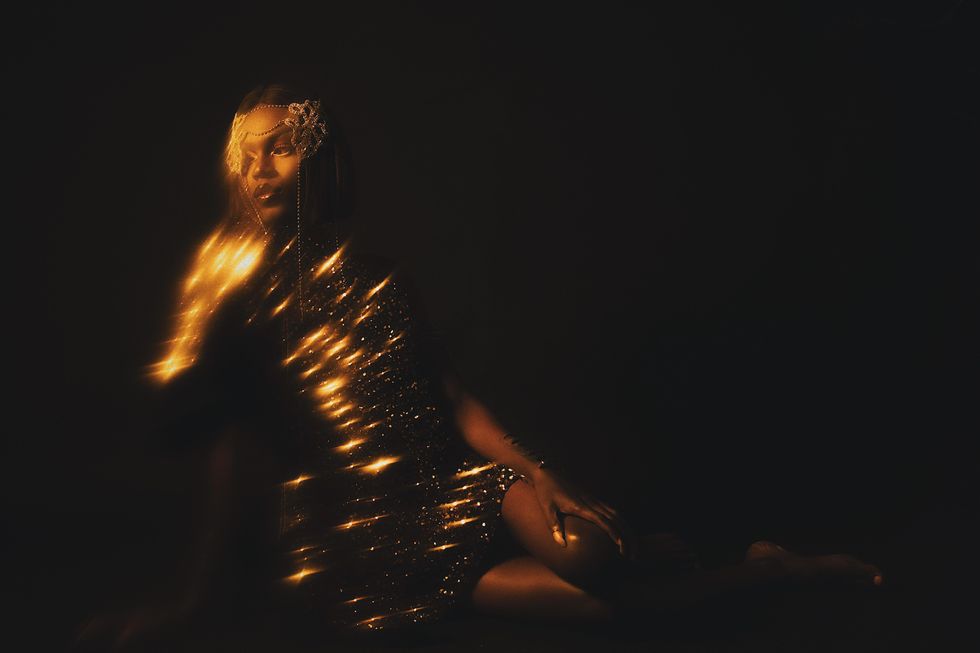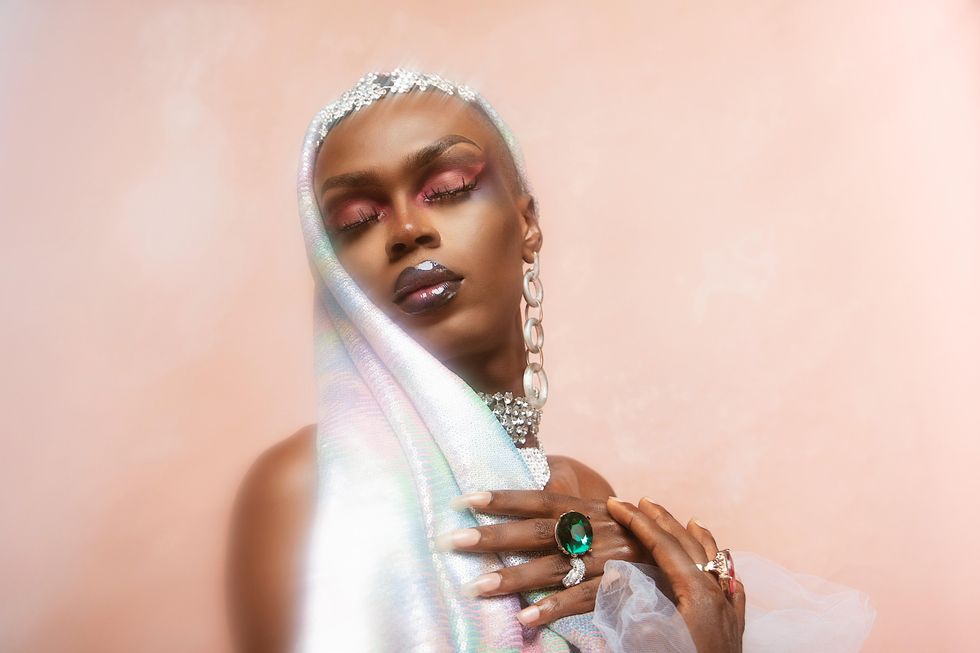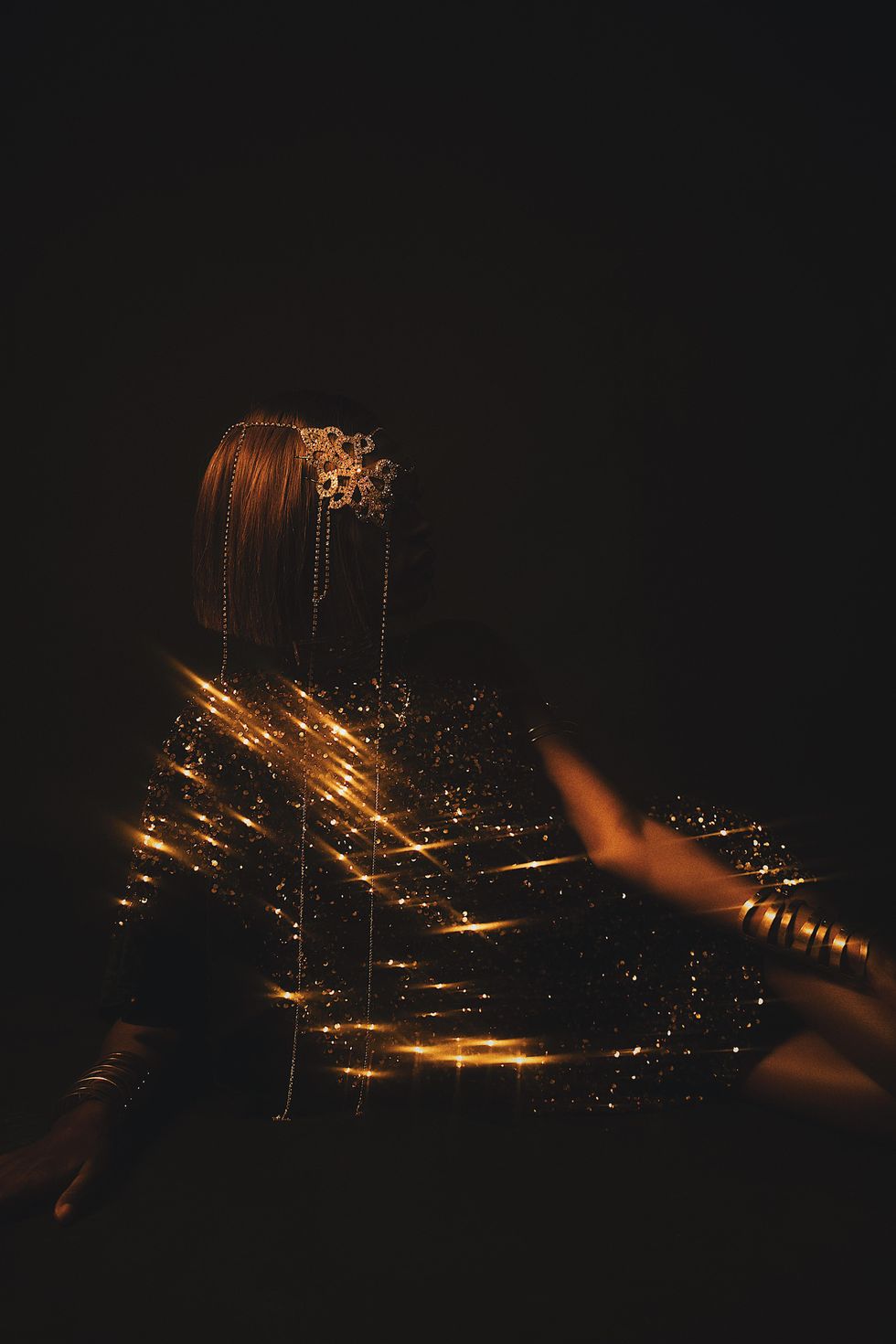
LGBTQ
Risk and Reward: Inside Nigeria's Thriving Drag Scene
Story by Desmond Vincent / Photography by Chuchu Ojekwe
08 November 2021

Kelly* is in boy drag when we meet, face without any makeup except for a bit of eyeliner that's easily missed. While sitting, I realize how regular we both look; at first, and even second glance, no one would be able to tell that Kelly is part of an underground drag scene thriving across Nigeria — but he is. On weekdays, Kelly, who uses he/ him pronouns out of drag and she/ her in drag, goes to his regular job as a teacher in a local primary school; on weekends, Kelly brings out her heels.
"I don't get to perform often, especially since COVID, but I make sure every weekend I get into drag even if it's just me and my friends." Kelly says. "Before COVID hit, my friends and I would go to a few spaces that knew us; we would dance, give a show and generally have fun."
While Port Harcourt's queer nightlife scene is smaller than in cities like Lagos, members of the community are making the most of it with DIY safe spaces. "In Nigeria, you can get arrested for being gay," Kelly says. "If the police find you wearing heels and dresses, there is a chance they'll either extort you or your family will never see you again, so we have to be careful."

Despite all these odds stacked against them — living in a conservative country with homophobic laws — these drag artists still find ways to thrive with secret clubs, house parties and performances at other nondescript locations. They do this all while accepting the possibility of a police raid happening, or worse.
"At any moment, people can come and carry you," Kelly says. "Sometimes it's not just the police, it could be the neighbors or people living in the area, which is why it is hard to stay in one location for long. If people clock that plenty of gay people — especially us queens are in a location — they won't wait for the police. They'll beat us or burn us, so we keep changing locations; we can use a hotel or someone's house. We all know how to pack our bags, clothes and makeup, and start running."
With the constant danger of being arrested or lynched, these drag queens have mastered the art of constantly moving. They often have to present masculine until they get to the venue and quickly change into full drag in a crowded bathroom alongside other queens just minutes before they hit the stage.
Performances here are similar to drag in the US — runway walks, varying categories, lip syncs to the latest afrobeat song — but the dance moves are very Nigerian. "We do a lot of waist whining and the kind of movements you'll expect of a Nigerian," Kelly says. "It's all very energetic and dramatic, and it's funny because we do a lot of performances to artists who are probably homophobic: Burna Boy, Simi and other artists that may not be the most accepting."

The internet has provided a space for drag artists to share their work with a semblance of safety. Today, James Brown, the self-titled "Princess of Africa," has nearly 600k followers on his Instagram, where he shares photos of himself in full drag. Beyond appearing in several fashion and beauty campaigns, he was also the subject of HBO Max's documentary, The Legend of the Underground, which documents Nigeria's underground queer subculture.
For all its positives, the internet also leaves queens vulnerable to homophobic attacks online, doxing and physical assaults by strangers in public. "Once you start [drag], you have to be ready for all the negativity Nigerians will bring your way." says Onyx Godwin, one of Nigeria's most famous drag queens. "I get threats all the time, on social media and in real life. I've lost important gigs that could have changed my life because many people don't want to associate with me publicly. I know of some drag queens that have been physically assaulted, including me."
This danger follows many drag artists in their day-to-day lives. In late 2019, Natasha*, a drag queen living in Nigeria's capital city Abuja, performed at a small club when a friend made an Instagram video of them in drag and posted it on their Stories. Natasha wasn't too worried because her friend had about 1500 followers and the account was private.

'The only people who had access were friends and as "woke as us, at least that's what we thought." Natasha says. "What we didn't know was that someone had recorded the video and sent it to one of our neighbors. One day, I came home and my neighbors knocked on the door and told me I needed to leave the compound because they didn't want to live with a demon. I was trying to explain myself and deny, but then they found my heels and used one to hit me on my head. I tried to defend myself, but there were too many [of them]. I was beaten, injured and sick for weeks."
Eventually, Natasha had to pack up her bags and leave the apartment as soon as she could, despite having over four months worth of rent at her last place and no money to pay for a new apartment. "Now I am very cautious," she says. "If you search my social media accounts, there's nothing that indicates I do drag. You'll never know because I don't want to be attacked or even killed because I am a drag queen."
These artists stick by their work despite the dangers of performing or living as a drag queen in Nigeria. For some like Onyx, it's because drag gives them the strength to deal with living in a country like Nigeria. "Drag is self-expression," she says. "With drag I can be anything and anybody I want to be. That's the major appeal for me. It's an escape. When I'm in drag, I feel powerful and beautiful."
For others, it's the community that comes with doing drag that keeps them invested. "Some people don't understand the level of bond I have with my drag family," Kelly says. "They have done more for me than my biological family can. Some of us live together and hustle together and feed ourselves from the little we have, and I just love all of them. The community is small, but it's self-sufficient. We've survived for so long and it is clear we're going to survive for even longer."
*Names have been changed for the sake of safety and privacy.
Photography: Chuchu Ojekwe
Styling: Reta Riman
Makeup: Anuoluwapo Babajide